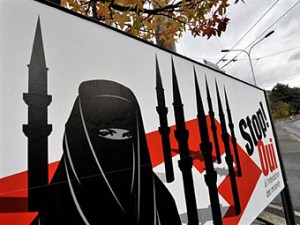Islamists and Liberals in Muslim Societies
Kirill Zhirkov presented his report at the regular seminar of the LCSR
 Kirill Zhirkov, an LCSR research fellow, presented a report on “Islamists and Liberals in Muslim Societies” at a seminar of the LCSR on September 27, 2012.
Kirill Zhirkov, an LCSR research fellow, presented a report on “Islamists and Liberals in Muslim Societies” at a seminar of the LCSR on September 27, 2012.
Kirill has been associated with this project over a long period of time. He presented his first progress report at a seminar in March 2012, which covered the main theoretical approaches and the conceptual framework of the project. His subsequent presentation presented the empirical results and the general progress of his work.
Kirill’s work pursued three objectives. He intended to operationalize Islamic extremism and see if it is widespread in Muslim societies, considering both demographic and ideological covariates to measure the influence on studied attitudes. The Pew Global Attitudes database served as the empirical basis for the research. The countries chosen for analysis were Indonesia, Jordan, Lebanon, Pakistan, and Turkey. The study was conducted on the lines of that carried out by the Gallup Center for Muslim Studies, especially the work of Esposito and Mogahed (2007).
The presentation focused on the three groups that were studied: liberals, moderates, and radicals. It attempted to demonstrate how belonging to any one of these groups affects attitudes toward the US and support for terrorism. To show an overall trend in three of the chosen countries (Lebanon, Pakistan, and Turkey) the study used mean comparison and latent class analysis so that the size of the selected groups could be gauged. The research suggested that the number of radicals and liberals rose considerably over five years in these countries, while there was a relative fall in the number of moderates.
The situation in Indonesia and Jordan differed from the situation in the other countries. In Indonesia the number of liberals and radicals decreased, and the number of moderates increased dramatically by 2010 (by about 30%). Judging by these factors, Jordan seems to be the most stable country, with no significant changes.
The paper proceeded to demonstrate how attitudes towards the US and support for terrorism amongst liberals, radicals, and moderates altered during the period 2005-2010. Support for the US amongst those who consider themselves liberals showed an upward trend. As for the moderates, by 2010 it seemed they had become unfavorable towards the US but rejected violence and categorically did not support terrorism. A downward trend was also detected in the support for terrorism among radicals even though their attitude remained unfavorable towards the United States.
The presentation generated a lively debate and several comments and suggestions were tabled. Eduard Ponarin, Christian Welzel, and Andrey Shcherbak advised the inclusion of more countries in the research project. The group also agreed to formalize the groups under study more accurately. For instance, the study could take into account gender attitude in different societies, to classify people according to religious belonging. Finally it was suggested to see whether religion, education, or gender play any role in attitudes towards the US and support for terrorism, and how strongly the responses of different groups differ.
by Anita Moiseeva
